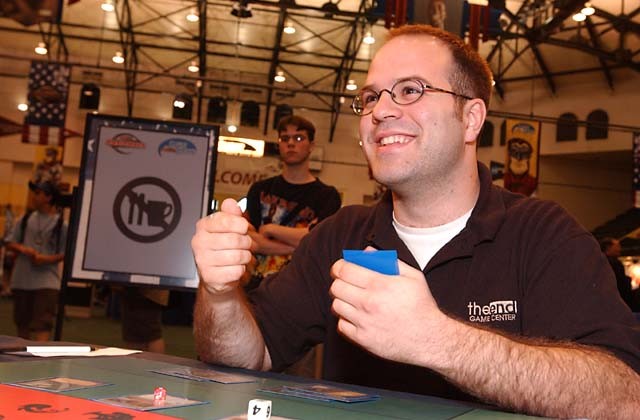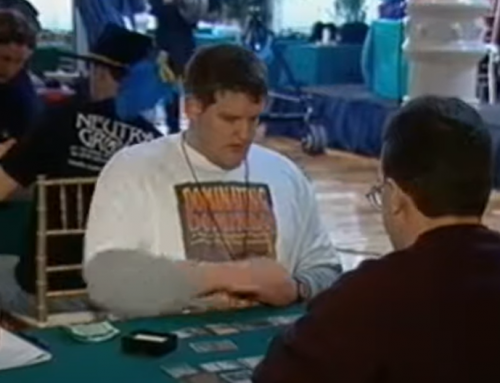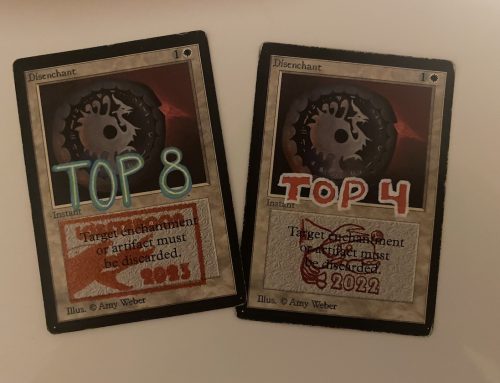There has always been some level of cheating in Magic. David Williams was disqualified from the top 8 of Worlds 2001 in Toronto for having a playset of marked Accumulated Knowledges which always found their way to the top of his library after he shuffled. Felipe Tapia Becerra clinched the Rookie of the Year title of the 2012-2013 season; but it was later found out that most of his victories were achieved by manipulating his opponent’s decks, forcing them to take multiple mulligans. He received a three-year suspension. Yuuya Watanabe was playing Tron in Mythic Championship II, which by itself is not a crime (although it should be); however, he was caught using marked sleeves, earning a disqualification and a ban.
Old school Magic is not exempt from scandals related to dishonest behavior. After Brian Weissman won the Old School Championship at MagicFest Las Vegas in 2019, evidence later surfaced that he had been playing with two copies of Circle of Protection: Red in his deck; but had later submitted a deck picture containing only one of them in the 75. he admitted swapping a copy of the cheesy enchantment for another card before handing over his deck box to the judge. The tournament organizer decided to annul the knock-out portion of the event, replay the final rounds of swiss and the top 8, increasing the tournament prize and issuing a public apology.

Antoine “Hercule” Rottiers won the NEOS monthly November Tournament by having an off-camera (or so he believed) stash of face-up cards -including Time Walk and Red Elemental Blast- which he would draw from at his convenience. Unfortunately for him, his cheating pile of brokenness was caught on camera, and there is footage of him drawing from this pile when he needed to. NEOS community leaders disqualified him, stripped from his previous titles, and banned him from all future events related to the NEOS community. Ouch.

Given that there are lots of articles about cheating in Magic and why it is bad for the game and the community, I will try to stay away from that. I believe cheating is self-evidently bad. Instead, I will try to explain why people cheat in Magic; how the old school community should approach dishonest behavior; and provide some best practices and practical tips to reduce cheating during webcam play.
What Drives Dishonesty
Common knowledge suggests that people who engage in cheating do so after making a rational cost-benefit analysis of whether to do so or not by weighing the advantages of cheating with the probability of getting caught and the disadvantages that it entails. However, while doing a bit of research for this article I stumbled upon the work of Dan Ariely, who has studied the behavioral aspects of dishonest conduct and cheating. Ariely defies the rational cost-benefit approach by stating that people suck at thinking about the long-term consequences of their actions, especially when it comes to cheating. According to Ariely, people cheat because they want to reap the benefits of their dishonesty while still feeling good about themselves; managing the inherent contradiction that this entails by using our human ability to rationally frame a situation in a way that makes that contradiction disappear. Ariely refers to this as a “human fudge-factor”.
Ariely also suggests that there are various factors that influence on whether someone will cheat or not. Some of these include (i) seeing people from your own social circle cheat increases the odds of cheating, while seeing people perceived to be from an opposing social circle cheat decreases those odds; (ii) people who believe that they are superior to others or that think that they have been somehow wronged have a higher chance of cheating; and (iii) people who are able to distance their conduct from the actual damage that dishonest behavior can cause are more likely to cheat.
I took these elements and tried to see if I could apply them to the Brian Weissman case. This was made possible mainly because of the in-depth interview that he gave for All Tings Considered with Bryan Manolakos; in which he provided a lot of insight to his personality, his history and his drive in the game. The result was surprising: all of Ariely’s factors are present. Brian was an old-school pro in the early days of Magic. During this period, cheating was commonplace. Multiple articles have been written on how many pros cheated their way to high results during the early days of the game, and Brian used to be a part of this community, to the extent that he still claims that he retains many of the habits of the early days of Magic, such as “guarding tech with his life”. He also claims to have been an associate of Mike Long, and found amusing some of his stories in which he blatantly cheated (03:09:20). Brian also felt wronged and he believed that he was required to obtain good results because he was “accountable to his legacy” (1:30:30), while lamenting that he did not have the results in the old school format that were “not commensurate with my abilities, my experience and my reputation” (1:31:20).
He also felt wronged when he overheard at Noobcon that he was not considered the best The Deck player in the old school community (01:33:15). He also expresses his frustration for not being able to clinch an old school title, regretting losing in the semifinals of Lurkercon against an opponent with “lack of experience”, “nerves”, and made “dubious choices” (00:28:40). Brian also believed that he did not deserve to lose against people playing “stupid mono red decks” (1:50:17). Finally, by playing in a casual tournament with prizes in the form of prize-wall tickets, he could potentially dissociate his actions from the actual syphoning of value that cheating in Magic involved. The Brian Weissman case is also an interesting way to demonstrate Ariely’s proposition that people suck at thinking of the long-term consequences of his actions when they engage in dishonest behavior. Weissman became a part of Magic’s Olympus as a theorist who discovered one of the fundamental concepts of the game which has influenced deckbuilding, in-game play and even the design of the game itself; but never really transcended as one of the game’s greatest players, despite being a really good one. However, in order to satisfy his need to be validated as a player and “get what he deserved” in the old school community, he ended up making decisions that tarnished his true legacy forever. Please note that while Brian was dishonest, his case is not as clear-cut as the Rottiers case in terms of actual cheating. This is developed in the next section of this article.
The debunking of the rational, cost-benefit analysis can also be seen in the Rottiers case. Antoine experienced some success in the European old school scene, and he likes to show off his results through his blog. After reading all of his posts, you can tell that he is a consummate spike and really loves to win, to the extent that the satisfaction of winning games of Magic made him feel so good about himself that he decided to engage in dishonest behavior. Again, the Rottier’s case shows how incredibly irrational people are when they decide to cheat. It’s clear that Antoine loved old school Magic very much (not as much as our own Andrés Hojman loves the format; that is not humanly possible) but an uncontrollable need to win apparently drove him to cheat on camera, and cheat sloppily to boot. He was obviously caught, and is now banned from all of the NEOS events, and other communities have followed their steps. Antoine got hit where it hurt him the most: the amount of old school Magic he gets to play online; and the less you play the less you are able to win. He also cast a shadow on all his prior victories, which shows how poor his judgement was.
Please note that while both Weissman and Rottiers are consummate spikes, it is absolutely wrong to infer that all spikes are cheaters, or that there is no room for spikes in old school Magic. I consider myself a competitive player. The beauty of the old school community is that there is space for people who want to delve into their creativity and brew a deck that conveys something that is greater than the sum of its parts and its overall strategic value, such as Dane Malone’s insanely creative, spicy, storytelling decks; but there is also room for the uber-spikes that bring tier-one decks to every tournament in order to maximize their win rate. A single old school tournament has room for both types of players, and proof of this is the existence for prizes for top result and awards for most creative builds in most large events, and that different groups of people thrive in each category. Also, most competitive players understand that Magic is a game with an incredible amount of variance, and that it is impossible to win every single game. The real competition is not with the opponent in front of you -they are just the day’s challenge- but with yourself, by trying to obtain good results in the long run by playing to the best of your abilities in every single match. Cheating is incompatible with that approach to Magic, or to life for that matter.
How the Old School Community Should Approach Cheating
The Weissman and Rottiers incidents should be taken as an opportunity to reflect on how the old school community should proceed in the future. I think that this is important for a two-pronged reason. The first prong is that the casual and unsanctioned nature of old school tournaments means that it cannot rely on the established channels that are used to enforce rules and convict cheaters in sanctioned events (judges, suspensions, bans, etc). The enforcement of rules has to come from the tournament organizers themselves, which are also members of the community. The second prong is that communities which mostly interact through social media tend to be more extreme and absolute in their reactions to these kinds of events than when they interact in the real world, which can lead to some unfair and hastened prejudgments. Let’s look at some examples:



As you can see all of these opinions are, to some extent, extreme. It is not true that the old school community is a snake pit full of cheaters, but it’s also not true that everyone is supposed to be friends with everyone else and therefore no one will ever cheat on a fellow old schooler.
I believe that the old school community is a place where a diverse group of people share a niche hobby which is incredibly fun, engaging, and fucking expensive. And as with all communities, it is almost inevitable that a small number of people will break the rules. Some will cheat on games of Magic. Others will scam others in online card transactions. However, it is important to recognize two things which Dan Ariely highlights in his research. The first one is that very few people cheat a lot. The second one is that almost everyone is a little dishonest in some aspect of their lives. It is part of human nature. Therefore, community members should be careful in throwing the proverbial first stone, without looking at the facts and the circumstances surrounding the event.

What I do believe that is truly special about the old school community is that there is a genuine bona fide approach to the game, which is consistent with the purity of a casual environment that makes most of us bring our best to the table. This makes interactions between old schoolers very pleasant.
In order to protect the format from cheaters, maintain the good vibe that exists between the community, and recognize our inherent shortcomings as humans, I propose that tournament organizers and community leaders strike a balance in the way that they sanction cheating by making a distinction between opportunistic cheatings and premeditated cheatings.
All cheating has three elements: (i) an intentional act or omission; (ii) which is against the rules; and (iii) aimed to obtain an unfair advantage. However, not all cheats should be equally sanctioned, even though they share these three common elements. Look at criminal law for example. Not all crimes carry the same punishment. Even a same crime can carry different punishments, depending on the circumstances which can aggravate or attenuate the wrongdoing.
Opportunistic cheating occurs when a player commences a game of Magic without the intention to cheat, but during the game certain circumstances arise that drives someone to cheat. An example of opportunistic cheating would be to knowingly cast a Fireball for X=8 when you only have seven mana sources, as a last-ditch effort to win the game. The vast majority of cheating in Magic is opportunistic cheating.

Premeditated cheating occurs when someone has the intention to engage in dishonest behavior even before the game of Magic has even started. An example of this would be to stack your opponents’ deck in order to force them to mulligan several times, in true Tapia Becerra fashion. What a cunt.

Felipe Tapia Becerra, a cunt.
Both are intentional actions that break the rules in order to take advantage in the game. So why make a distinction? Because in the case of opportunistic cheating, your human nature betrays you and you make a mistake by choosing to be a dick, despite your initial intention of abiding to the rules that govern a community. In the case of premeditated cheating, you walk through the door knowing beforehand that you are going to break the rules of the community and you just don’t care. You have decided to be an asshole before any circumstances gave you the opportunity to falter.
What should be the impact of this distinction? That’s the hard question to answer, and it will depend on the views of the community leaders and tournament organizers. My legal formation makes me want to suggest that opportunistic cheaters should be given lower punishment, and being offered the chance of redemption through confession. Nobody’s perfect, and someday that might even be you. Ariely states that the opportunity of a clean slate through redemption actually lowers serial cheating, which is really counterintuitive, but it makes a lot of sense if you think about it. On the other hand, premeditated cheating should be punished very strongly. There should be no space in old school for people who have a complete disregard for the rules and principles of the game, and which are entering into a game knowing beforehand that they are going to pull one on you.
Let’s take a look at how the Rottiers and Weissman examples fit with the opportunistic/premeditated distinction. In the Rottiers case, Antoine chose to hide his pile of silver bullets and game-winning power cards outside the range of the camera. This clearly shows a premeditated intention to cheat even before the game started. In my opinion this is a textbook case of premeditated cheating, and therefore the punishment served by NEOS community leaders was spot on. In a later post on his blog, Antoine asks for apology and redemption; but fails miserably to do so by claiming that his cheating was an opportunistic one and not a premeditated one. After examining the video footage carefully, I think that he is lying. This gives us another window to his character: someone who wants to get away with malicious dishonesty and does not think of the consequences. In my opinion, there should not be a space in the community for this type of people.
The Weissman case is far more complicated and nuanced than the Rottiers case. If Brian’s nerves, anxiety and insecurities took the best of him and made him take the dubious decision to take the CoP: Red from the pile of cards that did not form part of his sideboard, it is likely that he engaged in opportunistic cheating. If Brian had -in addition to his 75- an extra pile of cards in his deck box that he would use to sideboard depending on his matchup, it is likely that he engaged in premeditated cheating. If he did play with both CoP: Reds in his sideboard and then took one of them out for the deck picture, he could have engaged in premeditated cheating if he scouted the tables and knew that different card would have given him a higher chance of success in the top 8. If he just took out the enchantment to make an exception to his guard-tech-with-your-life principle, he was still dishonest with the tournament organizer and the judges, but it is harder to argue that he intended to obtain an unfair advantage. While some time has passed, and it is very hard to have a strong assessment of the facts, Brian did post a recent YouTube video in which he presents his case, basically stating that he screwed up by swapping the COP: Red only for the photo, and that he played with both copies throughout the swiss and during the top 8. If this the case, he was stupid and dishonest to swap a card for purposes of the picture (deck pics are a player’s representation of what he or she is playing throughout the tournament, and should be taken as a statement of fact), but he did not cheat.
Practical Tips to Reduce Cheating During Online Games
One of the main channels in which the old school Magic is played is through webcam tournaments online. After the Rottiers case, many community members claimed that webcam Magic provided an easy platform for cheating. While there is some truth to this, here are a few tips that the Earthquake League suggests to be implemented in order to minimize cheating.
- Show your face and be nice. Ariely’s research has shown that people are less likely to cheat on someone that has been nice to them therefore, a good way to deter cheating to show your face to your opponent before the match starts, and have a friendly conversation.
- Record your games. This will act as a deterrent to potential dishonest behavior from your opponent and will let you see how many mistakes you make during the game. Just let your opponent know that you are doing so.
- Everything should be on camera. Your library, battlefield, graveyard, hand and exile pile should be on camera at all times. It is also advisable to show your 15 sideboard cards face down before the match starts and put them back in you deck box before the first game. If things are not clear enough, just ask your opponent to adjust the camera. Don’t be shy.
- A brief reminder of morality. Ariely’s research shows that a quick reminder of morality is a very strong deterrent to dishonest behavior. How you do this is up to you, but try to give it a go.




